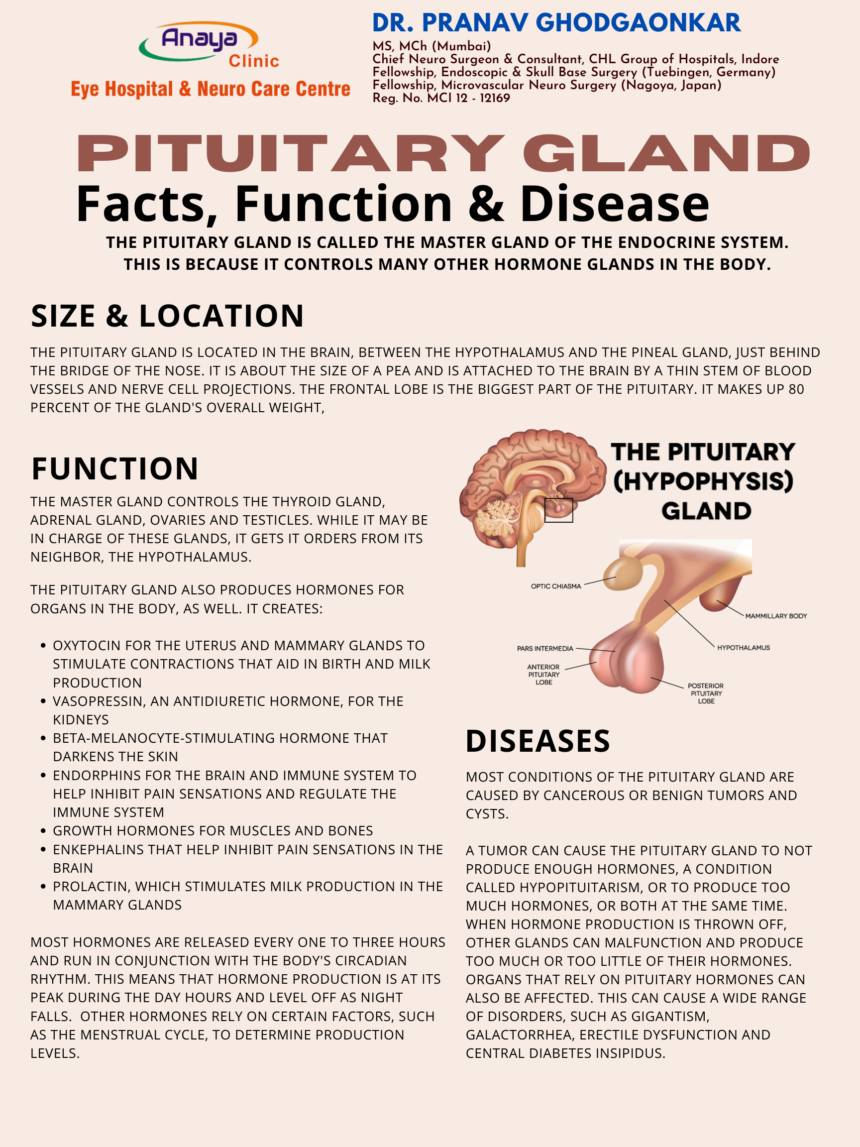Dr. Pranav, best neurosurgeon in Indore, share facts, functions and other important details about Pituitary Gland
Facts, Function & Disease
The pituitary gland is called the master gland of the endocrine system. This is because it controls many other hormone glands in the body.
Size & location of Pituitary Gland
The pituitary gland is located in the brain, between the hypothalamus and the pineal gland, just behind the bridge of the nose. It is about the size of a pea and is attached to the brain by a thin stem of blood vessels and nerve cell projections. The frontal lobe is the biggest part of the pituitary. It makes up 80 percent of the gland’s overall weight,



Pituitary Gland Function
The master gland controls the thyroid gland, adrenal gland, ovaries and testicles. While it may be in charge of these glands, it gets it orders from its neighbor, the hypothalamus.
The pituitary gland also produces hormones for organs in the body, as well. It creates:
- Oxytocin for the uterus and mammary glands to stimulate contractions that aid in birth and milk production
- Vasopressin, an antidiuretic hormone, for the kidneys
- Beta-melanocyte-stimulating hormone that darkens the skin
- Endorphins for the brain and immune system to help inhibit pain sensations and regulate the immune system
- Growth hormones for muscles and bones
- Enkephalins that help inhibit pain sensations in the brain
- Prolactin, which stimulates milk production in the mammary glands
Most hormones are released every one to three hours and run in conjunction with the body’s circadian rhythm. This means that hormone production is at its peak during the day hours and level off as night falls. Other hormones rely on certain factors, such as the menstrual cycle, to determine production levels.
Diseases
Most conditions of the pituitary gland are caused by cancerous or benign tumors and cysts.
A tumor can cause the pituitary gland to not produce enough hormones, a condition called hypopituitarism, or to produce too much hormones, or both at the same time. When hormone production is thrown off, other glands can malfunction and produce too much or too little of their hormones. Organs that rely on pituitary hormones can also be affected. This can cause a wide range of disorders, such as gigantism, galactorrhea, erectile dysfunction and central diabetes insipidus.
People with a pituitary gland tumor may experience the following symptoms or signs. Sometimes, people with a pituitary gland tumor do not have any of these changes. Or, the cause of a symptom may be a different medical condition that is not a pituitary gland tumor.
- Headaches
- Vision problems
- Unexplained tiredness
- Mood changes
- Irritability
- Changes in menstrual cycles in women
- Erectile dysfunction, which is the inability to achieve or maintain an erection in men and is caused by hormone changes
- Infertility, which is the inability to have children
- Inappropriate breast growth or production of breast milk
- Cushing’s syndrome, a combination of weight gain, high blood pressure, diabetes, and easy bruising that is caused by overproduction of the hormone ACTH (see below)
- Acromegaly, the enlargement of the arms or legs and thickening of the skull and jaw caused by too much growth hormone
A pituitary tumor causes symptoms in 3 different ways, which are discussed below:
- By producing too much of 1 or more hormones.
- Growth hormone. The symptoms depend on a patient’s age. In children, before the bone plates have closed, increased growth can cause gigantism, which is excessive body size and height. In adults, increased growth hormone causes acromegaly, a syndrome that includes excessive growth of soft tissues and bones, high blood sugar, high blood pressure, heart disease, sleep apnea, increased snoring, carpal tunnel syndrome, and pain, including headaches.
- Thyroid stimulating hormone (TSH). Too much TSH causes increased production of thyroid hormone. This can lead to nervousness and irritability, fast heart rate and high blood pressure, heart disease, increased sweating, thin skin, and weight loss.
- Prolactin. Too much prolactin, a hormone that stimulates lactation and the secretion of progesterone, causes inappropriate secretion of breast milk, even in men. It can also cause osteoporosis, which is weakening of the bones; loss of sex drive; infertility; irregular menstrual cycles; and the inability to have an erection.
- Adrenocorticotropic hormone (ACTH). Too much of this hormone causes weight gain, particularly in the body’s trunk. It can also cause high blood pressure, high blood sugar, brittle bones, emotional changes, stretch marks on the skin, and easy bruising.
- Gonadotropins (FSH and LH). These are usually not high enough to cause symptoms but can, in rare cases, cause infertility and irregular menstrual cycles in women.
- By pressing on the pituitary gland, causing it to make too little of 1 or more hormones.
- Growth hormone. Not enough growth hormone causes late growth in children, poor muscle strength, irritability, weakening of bone strength, and an overall unwell feeling.
- TSH. Low TSH causes fatigue, low energy, sensitivity to cold temperatures, constipation, and weight gain.
- Prolactin. Too little prolactin causes an inability to breastfeed after a woman gives birth to a baby.
- ACTH. Too little of this hormone causes fatigue and low energy, low blood pressure, low blood sugar, and upset stomach.
- Gonadotropins. Low levels of gonadotropins cause infertility, decrease in sex drive, an inability to have an erection, and irregular menstrual cycles.
- By pressing on the optic nerves or, less commonly, the nerves controlling eye movements, and causing either loss of part or all of a person’s sight, or double vision.
If you are concerned about any changes you experience, please talk with Neuro-specialist. Your Neuro doctor will ask how long and how often you have been experiencing the symptom(s), in addition to other questions. This is to help figure out the cause of the problem, called a diagnosis.

